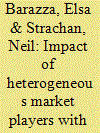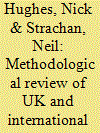|
|
|
Sort Order |
|
|
|
Items / Page
|
|
|
|
|
|
|
| Srl | Item |
| 1 |
ID:
111349


|
|
|
|
|
| Publication |
2012.
|
| Summary/Abstract |
Over the next decade, large energy investments are required in the UK to meet growing energy service demands and legally binding emission targets under a pioneering policy agenda. These are necessary despite deep mid-term (2025-2030) uncertainties over which national policy makers have little control. We investigate the effect of two critical mid-term uncertainties on optimal near-term investment decisions using a two-stage stochastic energy system model.
The results show that where future fossil fuel prices are uncertain: (i) the near term hedging strategy to 2030 differs from any one deterministic fuel price scenario and is structurally dissimilar to a simple 'average' of the deterministic scenarios, and (ii) multiple recourse strategies from 2030 are perturbed by path dependencies caused by hedging investments. Evaluating the uncertainty under a decarbonisation agenda shows that fossil fuel price uncertainty is very expensive at around £20 billion. The addition of novel mitigation options reduces the value of fossil fuel price uncertainty to £11 billion. Uncertain biomass import availability shows a much lower value of uncertainty at £300 million.
This paper reveals the complex relationship between the flexibility of the energy system and mitigating the costs of uncertainty due to the path-dependencies caused by the long-life times of both infrastructures and generation technologies.
|
|
|
|
|
|
|
|
|
|
|
|
|
|
|
|
| 2 |
ID:
125583


|
|
|
|
|
| Publication |
2013.
|
| Summary/Abstract |
Critical energy policy decisions rely on expert assessments of key future uncertainties. But existing modelling techniques that help form these expert assessments often ignore the existence of uncertainty. Consequently, techniques to measure these uncertainties are of increasing importance. We use one technique, expert elicitation, to assess six key uncertain parameters with 25 UK energy experts across academia, government and industry. We obtain qualitative descriptions of the uncertain parameters and a novel data set of probability distributions describing individual expert beliefs. We conduct a sensitivity analysis on weights for a linear opinion pool and show that aggregated median beliefs in 2030 are: for oil price $120/barrel (90% CI: 51, 272); for greenhouse gas price $34/tCO2e (90% CI: 5, 256) and for levelised cost of low-carbon electricity 17.1 US cents/kWh (90% CI: 8.3, 31.0). The quantitative results could inform model validation, help benchmark policy makers' beliefs or provide probabilistic inputs to models.
|
|
|
|
|
|
|
|
|
|
|
|
|
|
|
|
| 3 |
ID:
171500


|
|
|
|
|
| Summary/Abstract |
The energy sector transition requires large financial investments in low-carbon generation technologies, to be delivered by a variety of actors with heterogeneous characteristics. Real-world actors have bounded-rationality, reflected by their limited foresight and heterogeneous expectations, and as past trends influence their investments. Agent-based models are highly suitable modelling frameworks to study such realistic and complex energy transition dynamics. This paper introduces BRAIN-Energy, a novel agent-based model which explicitly allows to explore the impacts of actors' heterogeneous characteristics, and of their interactions, on the transition pathways of the UK, German and Italian electricity sectors. Results show that actors' heterogeneous characteristics pose barriers to effective decarbonisation efforts, affect the speed of the transition, and impact the transition's security of supply and affordability dimensions. Limited foresight and path-dependency lead to investment cycles (both virtuous and vicious). The country comparison highlights how such effects are stronger in markets with more heterogeneous market players.
|
|
|
|
|
|
|
|
|
|
|
|
|
|
|
|
| 4 |
ID:
098679


|
|
|
|
|
| Publication |
2010.
|
| Summary/Abstract |
Scenarios have a long history in business, politics and military planning, as a tool for strategic planning to inform protective, proactive or consensus-based decision making in the face of uncertain futures. Recent years have seen a growth in scenarios for assessing the implications of low carbon futures, but relatively little work has linked these energy scenarios to the broader literature on scenario development. This paper undertakes a methodological review of a selection of UK and international low carbon scenario studies, using a typology of 'trend based', 'technical feasibility' and 'modelling' studies. Dominant methodologies in such studies have been the 2×2 axis and the 'back-casting' approach. Strengths of the studies reviewed include technological detail, and identification of key economic and social constraints. Weaknesses include the over-reliance on constructs such as exogenous emissions constraints, and high level trends, which diminish the ability to understand how the various future scenarios could be brought about or avoided. This is compounded by the lack of depiction of specific system actors; the tendency to abstract policy from the scenarios; and the resulting failure to consider policy, technology and behaviour in an iterative, 'co-evolving' fashion.
|
|
|
|
|
|
|
|
|
|
|
|
|
|
|
|
| 5 |
ID:
109616


|
|
|
|
|
| Publication |
2011.
|
| Summary/Abstract |
This paper discusses the design and development of the Open Source Energy Modeling System (OSeMOSYS). It describes the model's formulation in terms of a 'plain English' description, algebraic formulation, implementation-in terms of its full source code, as well as a detailed description of the model inputs, parameters, and outputs. A key feature of the OSeMOSYS implementation is that it is contained in less than five pages of documented, easily accessible code. Other existing energy system models that do not have this emphasis on compactness and openness makes the barrier to entry by new users much higher, as well as making the addition of innovative new functionality very difficult. The paper begins by describing the rationale for the development of OSeMOSYS and its structure. The current preliminary implementation of the model is then demonstrated for a discrete example. Next, we explain how new development efforts will build on the existing OSeMOSYS codebase. The paper closes with thoughts regarding the organization of the OSeMOSYS community, associated capacity development efforts, and linkages to other open source efforts including adding functionality to the LEAP model.
|
|
|
|
|
|
|
|
|
|
|
|
|
|
|
|
| 6 |
ID:
098628


|
|
|
|
|
| Publication |
2010.
|
| Summary/Abstract |
This paper explores the prospects and policy implications for bioenergy to contribute to a long-term sustainable UK energy system.
The UK MARKAL technology-focused energy systems dynamic cost optimisation model-which has been used to quantify the costs and benefits of alternative energy strategies in UK policy making-is enhanced with detailed representation of bio-energy chains and end-uses. This provides an important advance in linking bioenergy expert-knowledge with a whole system modelling approach, in order to better understand the potential role of bioenergy in an evolving energy system.
The new BIOSYS-MARKAL model is used to run four scenarios constructed along the pillars of UK energy policy objectives (low carbon and energy security). The results are analysed in terms of bioenergy resources use and bioenergy pathways penetration in different end use sectors.
The main findings suggest that the complexity of different bioenergy pathways may have been overlooked in previous modelling exercises. A range of bioenergy pathways-notably bio-heat and biofuels for transport-may have a much wider potential role to play. The extent to which this potential is fulfilled will be further determined by resources availability, and market segment constraints, as well as policy measures to improve deployment.
|
|
|
|
|
|
|
|
|
|
|
|
|
|
|
|
| 7 |
ID:
117223


|
|
|
|
|
| Publication |
2013.
|
| Summary/Abstract |
Low carbon scenario and transition pathway analysis involves the consideration of uncertainties around future technological and social changes. This paper argues that uncertainty can be better understood, and the strategic and policy effectiveness of scenarios or pathways thereby improved, through a systematic categorisation of the different kinds of certain and uncertain elements of which the future is comprised. To achieve this, this paper makes two novel methodological contributions. First it proposes a system conceptualisation which is based on a detailed description of the dynamics of the actors and institutions relevant to the system under study, iteratively linked to a detailed representation of the technological system. Second, it argues that as a result of developing this actor-based low carbon scenarios approach it is possible to characterise future elements of the system as either pre-determined, actor contingent or non-actor contingent. An outline scenario approach is presented, based on these two contributions. It emerges that the different categories of future element are associated with different types of uncertainty and each prompt different strategic policy responses. This categorisation of future elements therefore clarifies the relationship of scenario content to specific types of policy response, and thus improves the policy tractability of resulting scenarios.
|
|
|
|
|
|
|
|
|
|
|
|
|
|
|
|
| 8 |
ID:
103351


|
|
|
|
|
| Publication |
2011.
|
| Summary/Abstract |
Aiming to lead amongst other G20 countries, the UK government has classified the twin energy policy priorities of decarbonisation and security of supply as a "centennial challenge". This viewpoint discusses the UK's capacity for energy modelling and scenario building as a critical underpinning of iterative decision making to meet these policy ambitions. From a nadir, over the last decade UK modelling expertise has been steadily built up. However extreme challenges remain in the level and consistency of funding of core model teams - critical to ensure a full scope of energy model types and hence insights, and in developing new state-of-the-art models to address evolving uncertainties. Meeting this challenge will facilitate a broad scope of types and geographical scale of UK's analytical tools to responsively deliver the evidence base for a range of public and private sector decision makers, and ensure that the UK contributes to global efforts to advance the field of energy-economic modelling.
|
|
|
|
|
|
|
|
|
|
|
|
|
|
|
|
|
|
|
|
|